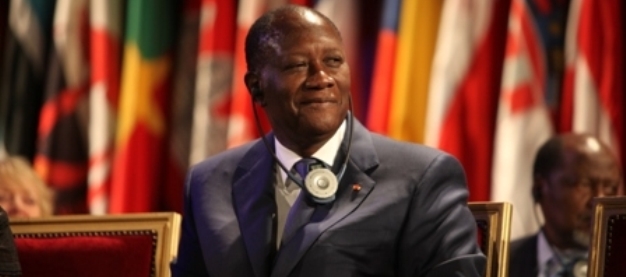UNESCO: President Ouattara\'s adress at the 36th UNESCO General Conference
query_builder 25-10-2011
President Alassane Dramane Ouattara, head of state of Ivory Coast, was at the 36th General Conference of UNESCO in Paris.
Seven head of States and Governement participated to this UNESCO Leaders Forum on the 26th and 27th in Paris
The main theme of the conference was \"How UNESCO helps does to build a culture of peace and sustainable development?\".
President Ouattara delivered a speech during the opening session. Here is the entire addressfrom the rostrum of the Unesco
His Excellency Mr. Pal Schmitt, President ofthe Republic of Hungary,
His Excellency Boni Yayi, President of the Republic of Benin
His Excellency Ali Ben Bongo Ondimba, President of the Republic of Gabon,
His Excellency Mr. Tillman Thomas, Prime Minister of Grenada
His Excellency Sukhbaataryn Batbold, Prime Minister of Mongolia,
Excellencies Ambassadors, Permanent Delegates to UNESCO,
Distinguished leaders of the governing bodies of UNESCO,
Ladies and Gentlemen,
On behalf of the State of Ivory Coast, and in my own name,
I would like to express my satisfaction to find myself within the walls of thisgreat and prestigious institution of UNESCO, for the second time in less thantwo months. Indeed, after September 14 where UNESCO has welcomed us for theceremony of the Félix Houphouët-Boigny peace is renewed joy than to be heretoday as part of the 36th session of the General Conference, to talk about theCulture of Peace and Sustainable Development.
I would like to thank MadamDirector-General Irina Bokova and Mrs. Eleonora Mitrofanova, President of theExecutive Board of UNESCO and for the honor done to my country and the Ivorianpeople as a whole.
Allow me this opportunity to welcome Mr. David HEPBURN who has just completedan excellent term as head of the General Conference of UNESCO and also pay myrespects to Mrs. Katalin Bogyay deferens, brilliantly yesterday elected to thepresidency of this body , wishing every success to the work taking place underhis leadership.
Excellencies, Ladies and Gentlemen,
We all know the relevance of UNESCO\'s mission to promote the defense of peace in the mind and heart of men and women remains relevant, especially since thechallenges are s \'increasing. We place our lives in the heart of the paradox,because despite the efforts of humanist organizations such as UNESCO, despitethe progress of science and technology, the world keeps undergo crises: foodcrisis, financial and economic crises, social crises, moral crises.
What more can UNESCO? But what UNESCO member states if we are? In otherwords, how should we rethink the way the world and act together to lead men andwomen to a better life? How and what to do to give the world a more human face?
Peace and sustainable development are the means, not just the most dreamed, but especially the most appropriate to achieve. Therefore, I congratulate UNESCOcreates the opportunity to meet with us to share our experiences and our hopesto enrich us and comfort us in our common quest for sustainable peace for thehappiness of man.
For my part, I agree that the culture of peace and sustainable development are intrinsically linked. As the two sides of the same reality, they overlap,interpenetrate and condition each other so that in speaking of the one, itnecessarily implies the other.
While sustainable development requires us to work to meet the needs of presentgenerations without compromising the ability of future generations to meettheir own needs, it is in peace and the culture of peace as possible. Peace istherefore a sine qua non. Without peace no development is sustainably possible.Therefore, I would focus my remarks on peace and its conditions, particularlyfrom the experience that has, alas, to know my country.
For this purpose, to identify the concept of culture of peace, I would take asa base the definition of peace given by the late, President FelixHouphouet-Boigny, at the Eighth Summit of the OAU in Addis Ababa June 22, 1971,definition in my opinion, continues to recover any relevance that makes thenews:
\"The peace within the African states should be based on justice,tolerance, dialogue, respect for human dignity and the respect for freedom,equality between men. But if the lack of dialogue means contempt of man, theconfiscation of freedoms, arbitrary, summary executions, it can have otherconsequences as agreed to raise objections to any attempt to overthrow theseregimes of oppression \"
Ladies and Gentlemen,
The difficult learning democracy has led the Ivory Coast in a paradoxicalsituation. She has been at war when it is the land of birth of the programmaticconcept of culture of peace. It was indeed at the International Congress onPeace in the minds of men gathered at the initiative of UNESCO from 26 June to1 July 1989. In its final declaration called Yamoussoukro Declaration on Peacein the minds of men, the Congress called upon States, intergovernmental and nongovernmental organizations, scientific, educational and cultural world, and allindividuals, between others, and I quote, \"help build a new vision ofpeace by developing a culture of peace based on universal values​​of respect for life, liberty, justice, solidarity, tolerance,human rights and equality between women and men. \" This vision of peacecoincided with the President Houphouët-Boigny had already expressed in 1971.
The rupture that has occurred in our country to understand and clarify the twobasic characteristics of peace, such as its fragility and sacredness.
Peace is fragile and delicate, which means it can disappear at any time. For along time, Ivorians, the majority, thought that peace was established for goodin their country. They just a glimpse of the war through the media. They havelearned to know the value of peace from the painful experience they have justexperienced. Why, we must cultivate peace as they do for a fragile plant inorder to enjoy its fruits.
Peace is like a sacred goddess must not offend the risk of exposing human lifeand death. War is the dramatic moment when played and trivial life. Thereforehonor the peace as they do for a true divinity.
For not having understood in time, we had war. The children of the samecountry, same family of one father, were insulted, have disowned, and have evenkilled. The sacred order of social cohesion has been broken. The war ismonstrous and gloomy because it causes death is the antithesis of life, the essentialprinciple of human existence.
Thus, the test of democratization misunderstood and conduct, peace has beendangerously upset in my country. It continues to be, unfortunately, in manyregions of our planet where human lives are destroyed, women and girls rapedand abused, property looted. The war and its horrors are more occurrences thanare peace, respect for human rights and all the benefits of democracy.
However I am satisfied with my people, and with the entire human community ofthe earth, there are always underlying reasons for hope as that which brings ushere today in this house of peace that is UNESCO.
Excellencies Heads of State and Ggouvernements,
Ladies and Gentlemen Ambassadors, Permanent Delegates
Distinguished leaders of the governing bodies of UNESCO,
In Ivory Coast, we decided to finally leave this made precarious and insecure. Ourcountry has decided to continue positively and qualitatively in its being andthe level of my remarks, I would like to reiterate our gratitude to the internationalcommunity for its continued support and unconditional.
Peace is not only possible, but even a total requirement, although its futureis complex. She has this property demanding that forces recipients to be at thesame time producers. True peace is that which we produce ourselves. It is theproduct of a collective adventure in which human beings share a common destiny.Its construction requires action holistic, multidimensional: physical,economic, financial, environmental, but also ethics.
What should be the means of access? How can we build lasting peace in ourcountry?
For my part, we must first put into practice the following precepts alreadymentioned, namely:
respect life, rejecting violence in all its aspects,-
respect the rights of man, and I stress, all the rights,-
use dialogue to resolve conflict peacefully, always inevitable among humans.-
Applying these precepts, in my opinion, are the cultural issues of peace, got hrough several strategies that we have decided to implement the one hand,definitely out of the war and the state of war, and secondly, to build aninclusive, prosperous, just and open to modernity.
Among these strategies, there is first the construction of democracy. Thiscompany is not new to many nations and UNESCO, but certainly it is for peoplerecovering from major trauma such as the one we experienced. This is adifficult task because it requires a commitment on all fronts, the mostdifficult are often at the level of spirits.
For the construction of democracy, we must build a genuine rule of law, whereno citizen is justice, where relations are governed by rules of law thateveryone agrees in theory and act scrupulously. For my part, I made thatcommitment and I want to promote the rule of justice and fairness. The way ofbuilding democracy is certainly difficult to take, but we will not abandon. Itis our opinion, the only way to lasting worth in this world of modernity. Allother routes will only strengthen it. To this end, we must fight againstpoverty, improve the quality of living, developing education and access tohealth care. So, as expected, these people better participate in politicaldecisions and national choices, governance will be improved and strengtheneddemocracy.
Therefore, I would, once again, thank UNESCO, which in this sense, we shallsupport through a special program overall post conflict in its various areas ofexpertise, by Resolution 34C/60, the decisions 179EX/38 and 180EX/43; programthat my country would like to see updated and strengthened for the next twoyears. We are strongly committed with regard to the urgency and magnitude ofthe physical and moral reconstruction which is binding on us.
Ladies and gentlemen, always in the direction of building lasting peace, onecan also explore the traditional ways of conflict resolution and buildingsocial cohesion by referring to our own culture and I think such alliancesjoking between various components of our people. Our researchers in IvoryCoast, and possibly elsewhere in Africa are on site research in thisperspective. We must encourage them, and hope that in time very close, theresults are usable in terms of modernity. The MOST Programme (Programme onSocial Transformations) of UNESCO can help us go further in this direction.
Moreover, by establishing the Commission Dialogue, Truth and Reconciliation, mycountry is aware that social cohesion requires provisions that go beyond thetraditional judicial mechanisms, as well as material and financial conditions. TheCommission will consider the ethical dimension of the restoration of socialcohesion. In this context it will certainly consider the experience of the dutyof forgiveness in the law. In fact, of course, the continuing crisis in oursocieties is a sign of moral also in crisis. Without excluding repentance, norjustice, the duty of forgiveness is to encourage each other to accept becauseforgiveness can dialectically conditioned repentance. But this ethicaldimension seems so abstract, so demanding that its implementation requiresgreat tact and delicacy. It\'s an almost religious dimension and highlyhumanistic often lack the consciousness of our time exploited.
Ladies and Gentlemen,
Of all the ways of seeking peace, those who turn it into an object of cultureby inducing values ​​and human behavior itself is the foundation onwhich everything must be based. I remain convinced that despite all thevicissitudes, peace is also an ethical requirement that is irreducibly writtenon the heart of the Ivorian people, even in the heart of every man. Even facedwith evil, man is able to respond to violence by renouncing violence by theprinciple of the obligation. Therefore, I consider that beyond the decisionsand actions laid down here and there, the task passes again through education.
In conclusion, I emphasize that in addition to the physical and materialculture of peace itself as an ethical and educational or more as a necessity ofconversion to peace. Education in this process, has a role to play. Moreover,treaties, agreements, seminars, conferences, improving material conditions andphysical life of nations, are also important. But alone, they run the risk ofbeing ineffective and unproductive. They are instruments whose effectivenessdepends on the agents of change we all need to be committing ourselves to theconstruction of its realization, as peacemakers. All peoples of the world arecapable of peace. Simply engage!
Thank you.





